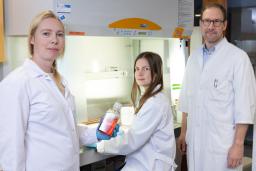Drug sensitivity testing helps target new pharmacotherapy for leukemia
Keywords:Drug sensitivity testing on leukemia cells can predict how patients with acute myeloid leukemia (AML) will respond to a new combination therapy. This approach allows treatments to be tailored to those who are most likely to benefit.

Tanja Ruokoranta, Ida Vänttinen and Mika Kontro. Photo: Ville Männikkö
Acute myeloid leukemia (AML) is the most common form of acute leukemia in adults. Several new targeted therapies have been developed for leukemia. However, the challenge is identifying the patients who would benefit from these treatments.
A Finnish study sponsored by HUS, published recently in the prestigious scientific journal Blood, examined if drug sensitivity testing of leukemia cells in the laboratory can be used to predict whether a patient with AML benefits from a new combination of venetoclax and azacitidine. The study showed that the sensitivity of the patient’s leukemia cells to venetoclax predicts both a good treatment response and longer survival.
"The method is an effective tool for personalizing treatment and helps identify patients who would benefit from a novel targeted therapy. It is especially useful for patients whose AML has relapsed after previous treatment. The results are promising, as selecting patients with the highest likelihood of response could reduce the adverse effects and costs associated with ineffective treatment,” says Mika Kontro, a hematologist at HUS and representative of the Institute for Molecular Medicine Finland (FIMM) at the University of Helsinki, who led the study.
Study accelerated the access to new leukamia drug
A total of 104 leukemia patients from all Finnish university hospitals participated in the groundbreaking study carried out by the Finnish AML group. In the drug sensitivity testing used in the study, leukemia cells collected from the patients’ bone marrow were exposed to several different drugs in the laboratory. The testing helped determine how the laboratory-defined drug sensitivity to venetoclax would predict the patient’s actual treatment response. Towards the end of the study, the method was used as a diagnostic test to support the decision to start the novel treatment.
"The study made it possible to have a new promising venetoclax medication available for the treatment of leukemia patients in Finland three years earlier than would otherwise have been possible," Kontro says.
Results readily available to guide treatment selection
The study showed that drug sensitivity testing can be completed quickly so that the results are available for selecting the patient’s medication.
Efficient logistics were required for the fast delivery of samples from five university hospitals to the research laboratory. Within just three days of sampling, the FIMM High Throughput Biomedicine unit provided doctors drug sensitivity data on leukemia cells, supporting timely treatment decisions.
"It’s also possible to use the method for other drugs, but more extensive use requires further examination," Kontro says.
In a university hospital, research is part of the treatment: we continuously evaluate and develop care based on scientific research evidence and patient experience. At HUS, we conduct close research collaboration with the Faculty of Medicine at the University of Helsinki. We publish approximately 2,400 peer-reviewed research articles) annually, which we highlight in our newsfeed.